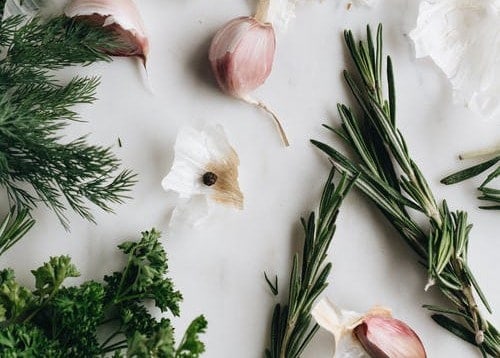Food of the Month – Fresh Herbs

Click here for a delicious and simple Chimichurri Sauce recipe.
Herbs have been cultivated since before written history. Monasteries were home to physic gardens which supplied food and medicine for the resident monks and their local communities.
Fresh herbs are an excellent way to flavor food without adding salt. Herbs pair well with the cuisines of their typical growing regions and are traditionally incorporated into that area’s cuisine. Cilantro compliments Latin and East Indian dishes; basil seasons Thai and Italian cuisine; rosemary, thyme, and parsley highlight French and American meals; and dill infuses Northern European dishes.
FYI: Mint can alleviate nausea and bloating but may aggravate acid reflux in some people.
Nutrition: Like other plant foods, herbs contain dietary fiber, water, and are low-calorie. They also are rich in bioactive compounds which support health and essential oils which give them their distinct aromas.
Add most herbs near the end of cooking to avoid bringing out bitter flavors.
There are over 600 varieties of mint (identified by their square shaped stems), with spearmint and peppermint the most common.
Fun Fact: Students in ancient Greece would tuck a sprig of rosemary behind their ear to help with memory.
Storage Tips: Basil should be stored in a glass of water at room temperature to avoid browning as it is cold-sensitive.
Soft herbs such as parsley, cilantro, dill, and mint should be washed, patted dry, given a fresh cut at the bottom of the stem by removing about ½”, and refrigerated in a glass of water with their tops lightly covered by a plastic bag.
Hard-stemmed herbs such as sage, rosemary, and thyme should be washed, dried, wrapped in a slightly damp paper towel, and refrigerated in a vented plastic bag.
Substitutions: 1 tablespoon fresh for each teaspoon dried. Dried herbs stored in an airtight container in a dark cupboard will last 1-3 years.
Soak woody rosemary stems in water for 20 minutes before using as kebab skewers.
Fun Fact: The gene OR6A2 is responsible for 4-14% of people thinking cilantro tastes like soap.
 Amber Phillips, MS, RD is a registered dietitian at Island Hospital. She has a Master’s degree in nutrition from Bastyr University in Kenmore, WA and a Bachelor’s degree in biology from Metropolitan State University, St. Paul, MN. Phillips has a keen interest in community education. “Nutrition advice can be confusing and sometimes conflicting,” says Phillips. “My role as a dietitian is to follow the latest research and make it easy to understand for my patients and the public.” To schedule an appointment with Phillips, call (360) 299-1300 x2567.
Amber Phillips, MS, RD is a registered dietitian at Island Hospital. She has a Master’s degree in nutrition from Bastyr University in Kenmore, WA and a Bachelor’s degree in biology from Metropolitan State University, St. Paul, MN. Phillips has a keen interest in community education. “Nutrition advice can be confusing and sometimes conflicting,” says Phillips. “My role as a dietitian is to follow the latest research and make it easy to understand for my patients and the public.” To schedule an appointment with Phillips, call (360) 299-1300 x2567.
Published on June 2, 2020
